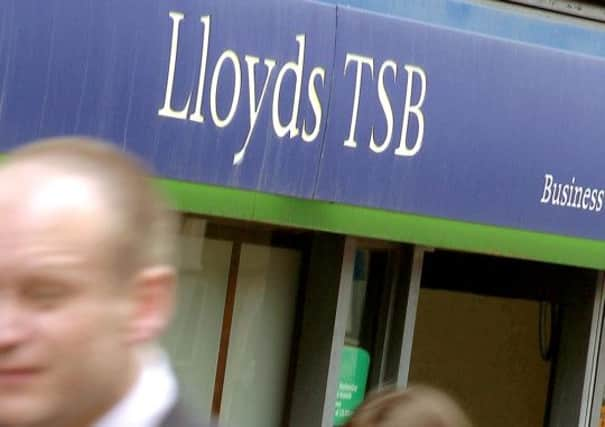Man wins Lloyds battle after going £2.67 overdrawn


Oliver Foster-Burnell, 28, went a few pounds over his £500 overdraft during a gap between employment contracts.
Lloyds Bank started charging him £20 a day and despite desperate phone calls he was hit with penalties of £743.
Advertisement
Hide AdAdvertisement
Hide AdThe unfair charges in 2008 meant he spiralled into debt after defaulting on other credit cards.


But after getting his finances back on track determined Oliver took the banking giant to county court and won his case - after the judge slammed the bank.
Not only has it been ordered to pay Oliver back - plus compensation and interest - but it means he can now take his landmark case to the High Court.
If Oliver and his legal team can convince the judge his ruling should apply to others, the banking sector could be forced to pay 12.6 million customers more than £30 billion.
Married Oliver, of Taunton, Somerset, said: “They really didn’t listen to me at all when I would call them every day to try and sort it out.
“It is unfair the banking industry is allowed to profit while people suffer financial hardship.
“It was incredibly stressful, I could just see the clock ticking and the debts adding up.
“I could just take the judgment from the court, but I don’t think the banks should continue doing this to other people.
Advertisement
Hide AdAdvertisement
Hide Ad“I can see the people they are doing this to most - it’s single mums, people struggling, and people who live close to the wire every month.”
Unison area organiser Oliver was working as an emergency care responder for his local council when he first got in trouble, in March 2008.
‘£20-a-day charges’
During a two-month break between contracts he went £2.67 over his £500 overdraft with his Lloyds Bank current account.
It took two weeks for the bank to send a letter to tell him they were charging him up to £20 a day.
For the first two months he was charged £165 a month, and then £75 a month until the following March, when he felt forced to employ a debt management company.
Due to the extortionate bills he ended up defaulting on two credit cards - one with Lloyds Bank - incurring further late payment charges of £1,400.
It took two years for him to pay off his debt, and he finally felt able to start tackling the bank - who were bailed out by the tax payer in 2008 - early last year.
He faced them in Taunton County Court in June and received his winning judgement last month - the day he arrived back from his honeymoon with new wife Rachel, 28.
Advertisement
Hide AdAdvertisement
Hide AdIt is the first known legal victory for a customer on the fairness of charges since banks won a Supreme Court hearing over the legality of fees in 2009.
Deputy District Judge Richard Stockdale made his decision based on European law which states that companies can not change your contract without an explanation.
He said the bank’s terms and conditions caused a ‘significant imbalance ... to the detriment’ of Oliver and ordered they should pay him back and remove a default on his credit file.
The judge was only able to make the judgment in respect of Oliver, so the unwavering claimant is appealing that part of the hearing at the High Court.
A ruling is not expected until next year.
‘If successful it will impact 12.6 million people’
“The judge in the hearing said ‘look I’m in a county court, I can’t rule something that’s so high up’,” he said.
“He can’t set a legal precedent, so we have to go up to the High Court for that.
“If successful it will impact 12.6 million people - quite big really considering it started with £2.67.
“The people it could apply to are anyone who the bank has charged at all, they don’t necessary have to be in financial hardship.
Advertisement
Hide AdAdvertisement
Hide Ad“My judgment was based on the fact that if you get a letter from your bank saying your terms and conditions have changed, an EU judgment, which we referred to, said they must be clear about how they have changed, and how they apply.
“My barrister is quite confident we’ll win, and he knows what he is doing.”
In 2005 people started challenging banks over unauthorised overdrafts, when they began to increase fees.
By July 2007, more than £800 million had been paid out by banks and the Office of Fair Trading stepped in to try to resolve the situation for all customers.
But the Supreme Court eventually ruled fees couldn’t be assessed under rules on fairness, effectively ending people’s ability to challenge their bank.
Oliver’s win is the first legal victory for a consumer in the fairness of charges since this change, and could pave the way for millions of others.
Pioneer
A spokesman for Lloyds Banking Group said: “We do not discuss individual customer cases and any decision will be specific to its facts. However, the legal issues relating to bank charges were dealt with comprehensively and conclusively by the judgment of the Supreme Court.”
Martin Lewis, founder of the Moneysavingexpert website hailed Oliver Foster-Burnell a ‘pioneer’.
Advertisement
Hide AdAdvertisement
Hide AdHe said: “It’s up to the court to decide if such a term can be unfair to all - regardless of whether they’re struggling in financial hardship.
“Potentially, we’re talking billions of pounds.”
Mike Dailly, principal solicitor at the free legal resource, the Govan Law Centre, said Oliver’s case is ‘potentially dynamite’ because the argument used ‘provides a new legal route to challenging unfair charges’.
Marc Gander, founder of the Consumer Action Group, said the judgment was a boost for consumers.
He added: “These extortionate charges are hugely unfair and it is absurd that the present law merely says courts must turn a blind eye to this issue.
“It’s about time bank customers got the fair treatment that they are entitled to by law.”
The figure of 12.6 million people potentially costing the banks £30 billion comes from a study by the Office of Fair Trading, of people who incurred costs between 2007 and 2012.